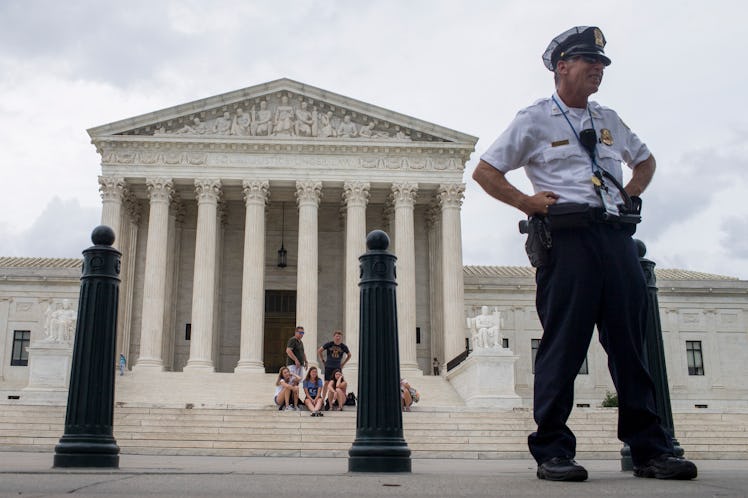
These Are The States That Would Ban Abortion If Roe Fell
There are at least 13.
The May 2 leak of a draft Supreme Court opinion in Dobbs v. Jackson has prompted widespread concern that Roe v. Wade will be overturned. It’s not a fun conversation to have, but it’s the reality that this country is living in. So if Roe v. Wade is overturned, these states might ban abortion — and things could get very ugly very fast.
In 1973, Roe v. Wade gave pregnant people in this country the right to an abortion on the federal level — a right that up until now has been upheld under the 14th Amendment’s implied right to privacy. But in his leaked draft opinion, Justice Samuel Alito argued that the right to an abortion is “not deeply rooted in the nation’s history and traditions” or “implicitly protected by any constitutional provision,” indicating that the court intends to overturn Roe, and thus, the federal right to abortion. If that happens, abortion won’t immediately become illegal on the federal level; instead, that decision would fall to individual states, meaning that states could choose whether or not to allow abortion within their borders. But since some states have already made it very difficult to get an abortion, there are definitely some areas where getting a legal abortion may be completely off the table.
As of June 2022, at least 13 states, including Louisiana and Texas, have “trigger laws” on the books, which means that those states would immediately ban most or all abortions the moment the Supreme Court overturns Roe. The other 11 states with trigger laws are Arkansas, Idaho, Kentucky, Mississippi, Missouri, North Dakota, Oklahoma, South Dakota, Tennessee, Utah, and Wyoming. Louisiana and three other states — Tennessee, Alabama, and West Virginia — have also amended their state constitutions to declare that abortion rights are specifically not protected under their states’ laws. In other words, these states have prepared in advance for the potential overturning of Roe.
Many other states also have extremely restrictive laws concerning abortion, even if they don’t have trigger laws or outright bans in place. According to reproductive rights think tank the Guttmacher Institute, 22 states have laws that could, or already do, restrict abortion access in a post-Roe United States. Of those, seven states have made it clear that they plan to restrict abortion to the greatest possible extent if Roe is overturned. And of course, there’s the Mississippi law at the center of Dobbs v. Jackson: In 2018, Mississippi passed a law to prohibit almost all abortions after 15 weeks — well before a pregnancy is actually viable. By bringing this case before the Supreme Court, the state of Mississippi is directly challenging the abortion protections codified in Roe v. Wade.
But there are also states that will definitely protect abortion if the country’s highest court decides to overturn the federal right to abortion. As of June 1, 16 states and the District of Columbia have abortion protections in place, per the Guttmacher Institute, with Colorado, New Jersey, Oregon, Vermont, and Washington, D.C. all protecting the right to an abortion through pregnancy. There are also a few states — Hawaii, Alaska, New York, and Washington — which had passed laws allowing abortion access prior to Roe, according to the Guttmacher Institute, which could mean they would legalize it on the state level again, should Roe fall.
In fact, New York has bolstered its abortion protections in advance of the Dobbs decision, per Politico, with Gov. Kathy Hochul signing a package of laws on June 13 that would protect abortion patients and providers alike from out-of-state legal retribution. However, even those who live in states that will protect abortion rights will see an impact from bans in other states — abortion providers in states like New York will likely see an uptick in patients traveling in from states where abortion becomes restricted or illegal.
“In many states, like California and New York and Connecticut, abortion will still be available, but people from the states where abortion is made illegal will travel to the states where it’s legal,” Carrie N. Baker, Ph.D., a professor of the study of women and gender at Smith College, previously told Elite Daily. “And so for people in states where it’s legal, waiting periods will get longer, it will take longer to access abortion.” In states like Oklahoma and South Dakota, clinic closures have already resulted in patients traveling further to seek abortion care, per The New York Times.
Even though Roe v. Wade hasn’t been officially overturned yet, it’s becoming more likely that this will happen — not only because of Alito’s leaked draft opinion but also because of the Supreme Court’s conservative majority. As of 2022, the court has a 6-3 conservative majority, following President Trump’s appointment of Justices Amy Coney Barrett, Neil Gorsuch, and Brett Kavanaugh. According to Politico, Barrett, Gorsuch, Kavanaugh, and Justice Clarence Thomas all voted in the majority with Alito ahead of the leaked draft opinion in Dobbs v. Jackson.
The prospective overturning of Roe has prompted waves of concern among reproductive rights advocates. Many Americans have already felt the devastating consequences of abortion restrictions in states that currently limit abortion care, facing longer wait times, prohibitive transportation and lodging costs, and even the criminalization of miscarriage in some states. At the same time, advocates are also concerned that a repeal of Roe v. Wade could jeopardize other civil liberties, such as birth control access or same-sex marriage.
The Supreme Court is expected to hand down its decision in Dobbs v. Jackson in late June or early July.
This article was originally published on